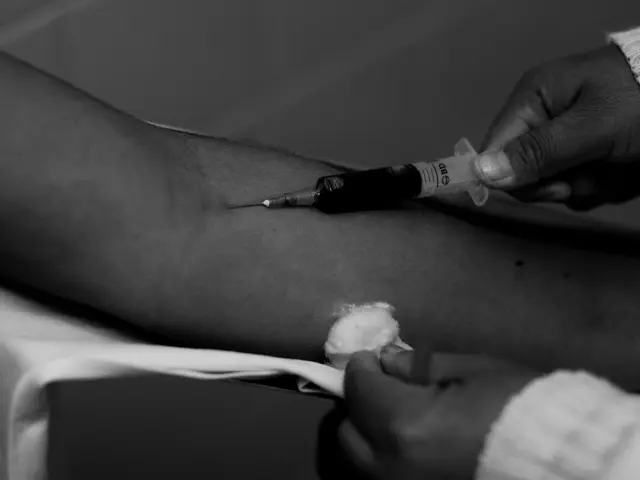Your Friendly Guide to Medicare Coverage of A1C Tests for Diabetes Screening
Medicare support for A1C testing during prediabetes?
Let's dive into the lowdown on Medicare coverage for A1C tests, your go-to blood test for monitoring diabetes treatment and identifying potential diabetes risk. Buckle up, because we're about to cover everything from eligibility to the Medicare Diabetes Prevention Program!
Putting A1C Tests under the Microscope
An A1C test measures the average blood glucose levels over the past three months, reported as a percentage. Simply put, the higher the percentage, the higher your glucose levels have been. An optimal A1C level is below 5.7%.
Medicare to the Rescue
Great news for Medicare beneficiaries! As of 2024, Medicare Part B covers A1C tests for both diabetes monitoring and screenings.
Blood Screenings without Barriers
Under Medicare Part B, individuals at high risk of diabetes or already diagnosed with diabetes can receive up to two blood glucose screenings per year. Qualifying factors include a history of high cholesterol, high blood pressure, an previous high blood sugar episode, or obesity. Additionally, your healthcare provider may deem you eligible for screenings if you meet two or more of the following criteria:
- Age 65 years or older
- Overweight or obese
- A family history of diabetes
- Previous gestational diabetes
The Medicare Diabetes Prevention Program - Prevention with a Purpose
The Medicare Diabetes Prevention Program is a comprehensive health program aimed at helping people avoid type 2 diabetes through lifestyle modifications. This program is available free of charge to individuals who meet the following criteria:
- Within 12 months of beginning the program, they have any of the following:
- a fasting plasma glucose of 110 to 125 milligrams per deciliter (mg/dL)
- a 2-hour plasma glucose of 140 to 199 mg/dL
- an A1C test result between 5.7% and 6.4%
- They have a body mass index (BMI) of 25 or higher.
- They have never received a diagnosis of diabetes or end stage renal disease.
- They have not participated in the Medicare Diabetes Prevention Program before.
[1] Medicare coverage of A1C tests for diabetes screening: https://www.medicare.gov/coverage/diabetes[2] Medicare Diabetes Prevention Program: https://www.cdc.gov/diabetes/prevention/mdpp.html[3] Diabetes Risk Factors: https://www.mayoclinic.org/diseases-conditions/diabetes/symptoms-causes/syc-20369960[4] Eligibility Criteria for MDPP: https://www.cdc.gov/diabetes/prevention/resources/programs/mdpp_eligibility_criteria.pdf[5] Understanding Hemoglobin A1C Testing: https://www.cdc.gov/diabetes/library/pubdetails/dh10-1107.html
- In the Medicare Diabetes Prevention Program, individuals can receive assistance in avoiding type 2 diabetes through lifestyle modifications if they have a high A1C test result, which is an uncategorized aspect of diabetes screening.
- Medicare Part B covers A1C tests for both diabetes monitoring and screenings, but it also provides coverage for individuals at high risk of diabetes based on certain factors such as high cholesterol or obesity.
- Healthcare providers may deem individuals eligible for blood glucose screenings under Medicare Part B if they meet two or more criteria, such as being 65 years or older or having a family history of diabetes.
- People who meet the criteria for the Medicare Diabetes Prevention Program can participate in this program free of charge, which aims to prevent diabetes through lifestyle modifications, but it does not cover end-stage renal disease.




